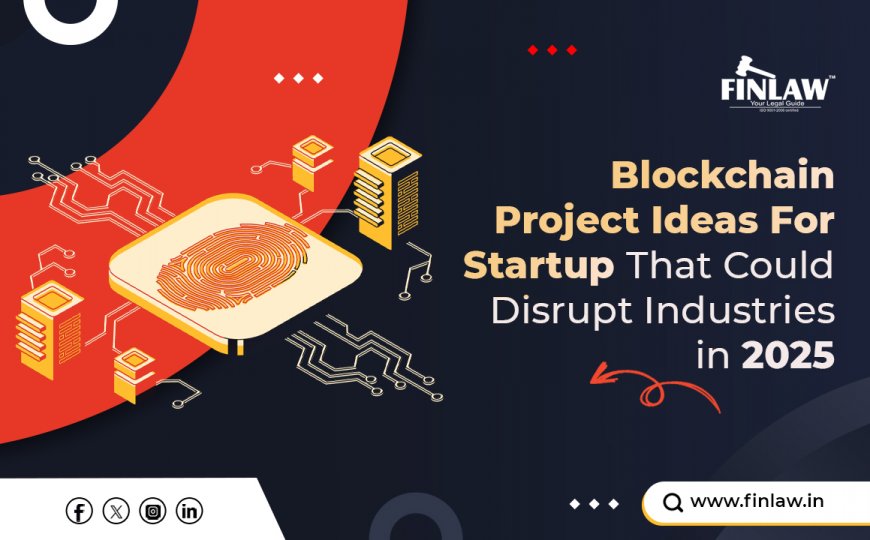Blockchain Project Ideas for Startups That Could Disrupt Industries in 2025
Discover top blockchain project ideas for startups in 2025. Explore real-world applications, opportunities, and compliance essentials in India.

Blockchain technology has evolved far beyond cryptocurrency. In 2025, blockchain is poised to disrupt multiple industries across India — from finance to healthcare, agriculture to real estate. For entrepreneurs seeking innovative blockchain project ideas, the possibilities are endless.
In this article, we explore the best blockchain project ideas for startups, including real-world applications in finance, supply chain, digital identity, and more. Whether you're looking to launch a fintech venture, an agri-tech platform, or a new DeFi protocol, this guide will inspire your next big move.
Why Blockchain Startups Are Booming in India
Before diving into blockchain project ideas, it’s important to understand why India is becoming a hotspot for blockchain innovation:
-
Government Initiatives: Programs like 'Digital India' and the RBI’s exploration of CBDCs (Central Bank Digital Currencies) show strong government interest.
-
Growing Talent Pool: India produces thousands of blockchain developers annually, making it easier for startups to hire.
-
Fintech Growth: India is among the world’s top fintech markets, where blockchain can further enhance security and transparency.
-
Investor Confidence: Venture capital investments in Indian blockchain startups crossed $500 million in 2024.
Thus, 2025 is a golden window for entrepreneurs to launch blockchain-based startups.
10 Best Blockchain Project Ideas for Startups in India (2025)
1. Decentralized Finance (DeFi) Platforms for Financial Inclusion
India has over 190 million unbanked adults, according to the World Bank. Building DeFi platforms that offer microloans, decentralized savings accounts, and yield farming tools can bring financial services to rural and semi-urban populations.
Key Technologies:
-
Smart contracts (Ethereum, Polygon, Solana)
-
Stablecoin integrations for low volatility
-
Mobile-first DeFi apps (critical for India’s smartphone-first users)
Example:
-
A DeFi app offering farmers microloans based on crop history stored on blockchain.
Why it will succeed:
-
Fills gaps left by traditional banks
-
Financial empowerment for small businesses and individuals
2. Blockchain-Based Supply Chain Management Solutions
Supply chain inefficiencies cost Indian industries billions every year. Blockchain can ensure full traceability and reduce fraud across sectors like agriculture, pharmaceuticals, and consumer goods.
Features:
-
Digital twins and smart tagging (IoT + blockchain)
-
Automated compliance with government regulations (especially important post-GST reforms)
-
Real-time visibility dashboards
Example:
-
Tracking organic tea leaves from Assam farms to international buyers.
Real-World Application:
-
StaTwig (an Indian startup) already uses blockchain for vaccine supply chains.
3. Self-Sovereign Identity (SSI) Systems
Digital identity is crucial for India's next digital revolution. Self-sovereign identity solutions can help millions verify their identity securely, especially important in areas like KYC processes, voter ID registration, and public services.
Opportunities:
-
Blockchain-based Aadhaar alternatives
-
Student IDs for online education verification
-
Employee onboarding for HR tech startups
Example:
-
A blockchain wallet that stores verifiable credentials for healthcare, education, and finance.
4. NFT-Based Real Estate Marketplace
Land disputes and property fraud are huge challenges in India. Launching a blockchain real estate startup that issues property NFTs can simplify ownership transfer, reduce fraud, and speed up transactions.
Features:
-
Digital land registry
-
Tokenized fractional ownership
-
Mortgage smart contracts
Example:
-
An NFT marketplace where buyers can invest Rs. 10,000 to own fractions of commercial real estate properties in Mumbai.
5. Blockchain in Education for Certificate Verification
Imagine a system where employers can verify a job applicant’s degree instantly — no background check companies needed.
Use Cases:
-
Universities issue blockchain-verified diplomas
-
EdTech startups validate course completions
-
Skill-based credentials (coding bootcamps, online certifications)
Example:
-
An app where employers scan a QR code linked to a candidate’s blockchain-stored degree.
6. Blockchain-Powered Healthcare Data Systems
India's healthcare system struggles with fragmented patient records. Startups can offer blockchain health records, giving patients ownership of their medical data.
Features:
-
Health wallet apps for patients
-
Permissioned access for doctors and hospitals
-
Cross-institutional patient history
Real-World Example:
-
Apollo Hospitals is experimenting with blockchain to securely manage patient records.
7. DAO-Based Governance Platforms
Housing societies, educational institutions, and cooperatives often suffer from opaque governance. Decentralized Autonomous Organizations (DAOs) offer a transparent alternative.
Opportunities:
-
RWAs (Resident Welfare Associations) using DAOs for decision-making
-
Startup accelerators running transparent DAO funding programs
Example:
-
An apartment complex in Pune is managing maintenance funds through a DAO.
8. Intellectual Property Protection Using Blockchain
Creative sectors like Bollywood, gaming, and publishing often battle piracy. A blockchain IP registry can record, timestamp, and protect original works.
Solutions:
-
NFT marketplaces for musicians and writers
-
Copyright verification platforms
-
Smart contracts for royalty distribution
Example:
-
A blockchain platform where indie musicians upload and tokenize their songs.
9. Farm-to-Fork Agricultural Blockchain
Food fraud and pesticide misuse are major concerns in India. A blockchain-based farm-to-fork system can assure consumers of product authenticity.
Features:
-
IoT sensor integration for crop monitoring
-
Certification for organic produce
-
Mobile app for consumer traceability
Example:
-
A startup that verifies "organic mangoes" via blockchain-backed supply data.
10. Blockchain Voting Systems for Local Elections
Electronic Voting Machines (EVMs) have faced scrutiny in India. Blockchain-based voting apps could offer a tamper-proof and transparent alternative.
Use Cases:
-
College student union elections
-
Corporate shareholder voting
-
Panchayat or municipality elections
Example:
-
A blockchain mobile voting app piloted for student council elections in Delhi colleges.
Bonus Blockchain Startup Ideas (2025 and Beyond)
-
Carbon Credit Marketplaces: Enable companies to trade carbon credits transparently.
-
Blockchain Loyalty Programs: Reward customers across brands with a unified loyalty token.
-
Cross-Border Payments for SMEs: Faster, cheaper remittances for Indian exporters.
Of course! Here's the updated final section, adding the importance of regulatory and compliance in blockchain projects at the end — seamlessly integrated to maintain flow and boost SEO.
Importance of Regulatory Compliance in Blockchain Projects
While blockchain offers limitless innovation potential, startups must pay close attention to regulatory and compliance issues, especially in India’s evolving legal environment. Ignoring this can lead to major setbacks, legal penalties, or even shutdowns.
Here’s why regulatory compliance is crucial for blockchain startups:
1. Building Trust with Users and Investors
Adhering to legal norms reassures users and investors about the safety and legitimacy of your project. In industries like finance, healthcare, and real estate, compliance builds critical trust.
Example: A DeFi lending platform that complies with RBI guidelines on digital lending will attract more users and partners.
2. Avoiding Legal Penalties
India’s regulatory bodies like the RBI, SEBI, FIU, and the upcoming Digital India Act are closely monitoring blockchain applications. Non-compliance could result in hefty fines, bans, or criminal charges.
Key Compliance Areas:
-
Data protection (Personal Data Protection Act, 2023)
-
Anti-money laundering (AML) and counter-terrorist financing (CFT) requirements
-
SEBI regulations if launching tokenized securities
3. Facilitating Easier Scaling
A compliant project faces fewer barriers when expanding into new states within India or even internationally. Investors and partners prefer businesses that have already cleared legal due diligence hurdles.
Example: A blockchain-based healthcare data platform compliant with HIPAA (US) and India's data privacy laws can easily scale into international markets.
4. Enhancing Project Sustainability
Many blockchain startups fail not because of technology flaws, but due to regulatory crackdowns. Understanding and integrating compliance from day one ensures long-term sustainability and prepares the project for changes in the regulatory landscape.
Tip:
-
Hire legal advisors early.
-
Regularly monitor government notifications on digital assets and blockchain.
-
Engage proactively with regulators, where possible.
Final Words: Choosing the Right Blockchain Project Idea
In 2025, the Indian startup ecosystem will be vibrant with blockchain-driven disruption. However, success will not only depend on great blockchain project ideas but also on robust regulatory compliance, clear user value, and relentless innovation.
If you’re planning your next blockchain startup journey, combine technological brilliance with legal foresight — that’s the winning formula for disrupting industries and building a sustainable future.
While blockchain opens countless opportunities, a successful blockchain startup must:
-
Solve a real-world problem.
-
Comply with Indian regulations (keep an eye on RBI and SEBI updates).
-
Focus on user experience (blockchain should be invisible to the end-user).
-
Build on scalable, cost-effective platforms (Polygon, Tezos, etc.).
By 2025, startups that build with trust, transparency, and user empowerment in mind will stand out — and possibly disrupt entire industries.
If you're looking for blockchain project ideas that can make an impact in India and beyond, this is your time to innovate.
Frequently Asked Questions (FAQs)
1. What are the best blockchain project ideas for startups in 2025?
Some top ideas include DeFi platforms, NFT-based real estate marketplaces, blockchain healthcare systems, supply chain traceability apps, and DAO-based governance platforms.
2. Is blockchain a good career path in India?
Yes, blockchain development, architecture, and entrepreneurship offer lucrative opportunities. India has a growing demand for blockchain skills across sectors like finance, healthcare, and supply chain.
3. Which industries in India are ripe for blockchain disruption?
Finance, agriculture, healthcare, education, supply chain logistics, and public governance are among the top sectors poised for blockchain disruption.
What's Your Reaction?



















